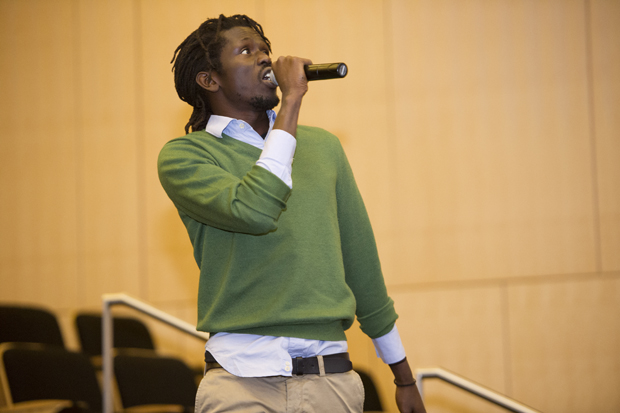From child soldier to hip-hop star

Emmanuel Jal struts, shimmies, and shakes his lithe frame with the fluidity and assurance of a rock and roll star.
His shoulder-length locks sway from side to side as he belts out the chorus to “We Want Peace,” an up-tempo hip-hop number that calls for an end to violence in the Sudan. “I’m calling on the whole wide world,” he howls, as approximately 100 Northeastern University students clap and move in lockstep with the groove. “Let’s scream and shout, cause we want peace.”
Jal’s music is the medium through which he promotes his philosophy of “justice, equality, and freedom for all.” On Thursday evening in 20 West Village F, he recounted his story, a harrowing journey from child soldier in the Sudan People’s Liberation Army in the late 1980s to international hip-hop star and humanitarian of the Internet age.
The two-hour event was the latest installment of the Northeastern Students4Giving (NS4G) Social Impact Lecture Series and was sponsored by the Arthur K. Watson Charitable Trust.
In her opening remarks, Rebecca Riccio, founding program director of NS4G, called Jal “one of a handful of people in the world whose humanity is so deep that it transcends language, culture, and geography.”
Jal’s story is one of tragic loss, rebirth, and humanitarianism, a tale of finding light in the heart of darkness. He has shared his plight with thousands of people, from prisoners in Mexico to rapt audiences at global conferences like TED. In 2008, he founded the Lose to Win Challenge, with the goal of raising 1.6 million pounds to support education, awareness, and positive change in Africa and around the world.
“If you lack playing a part in giving back to mother Earth,” he explains, “then you are going to be a very sad person.”
Jal’s sadness dates back to the tumult of his seventh year. Following his mother’s death in the Second Sudanese Civil War, he was recruited by the SPLA and taken from the Southern Sudan village of Tonj to a military training camp in Ethiopia. When war broke out in the landlocked country, he rejoined the army’s fight against the government in the Sudanese town of Juba.
He later escaped and embarked on a three-month journey to the town of Watt, where a British aid worker named Emma McCune smuggled him into Kenya and enrolled him in school for the first time. But the voyage to deliverance proved near fatal. Supplies were scarce and food comprised snails, snakes and vultures. Starving, he once told a dying friend that he would be forced to resort to cannibalism in order to survive.
Fate intervened, according to Jal, a man of strong faith. “I prayed that I would get something to eat, and if I survived I would give God credit,” he says. “A crow came and I ate it from the feathers to the intestines.” Jal lived.
Following his lecture, he fielded questions posed by students in the audience, many of whom were struck by his light-hearted story-telling approach and spastic dance moves. One student asked Jal how he copes with the pitfalls of fame. “Sin is fun,” he replied, and then added, “How you choose to resist shows what kind of strength you have.”





